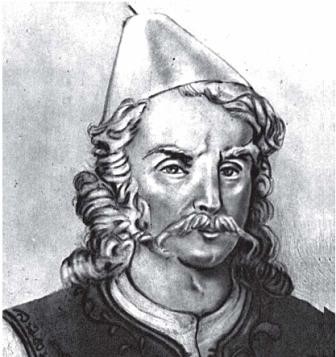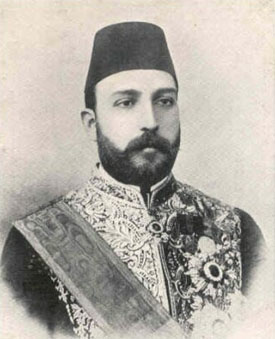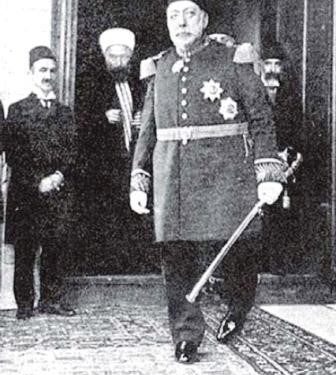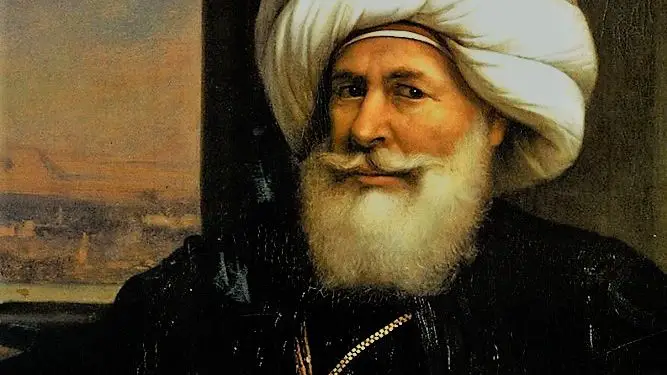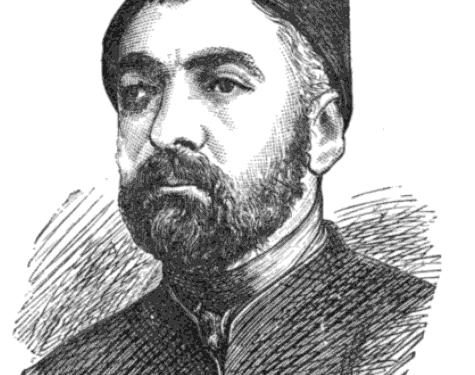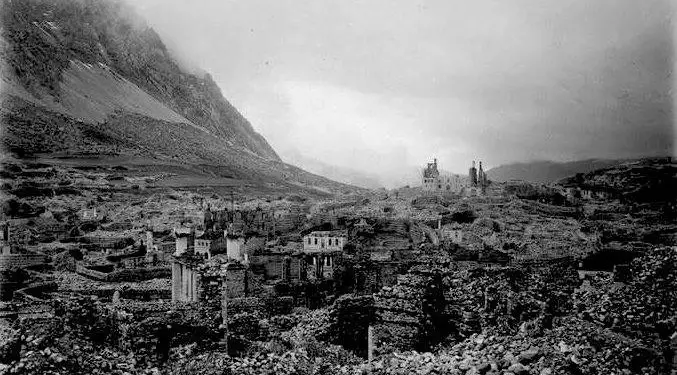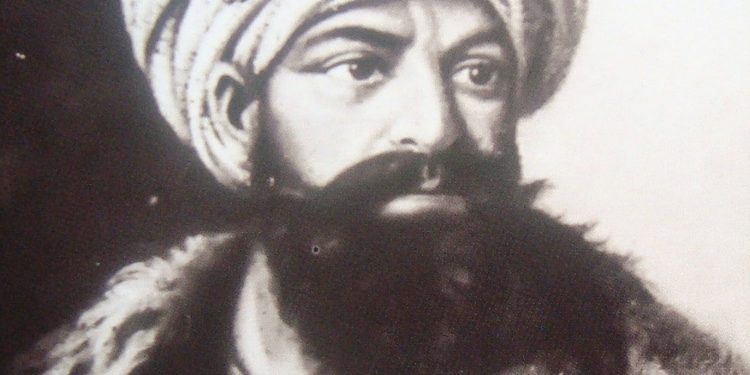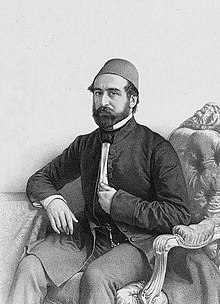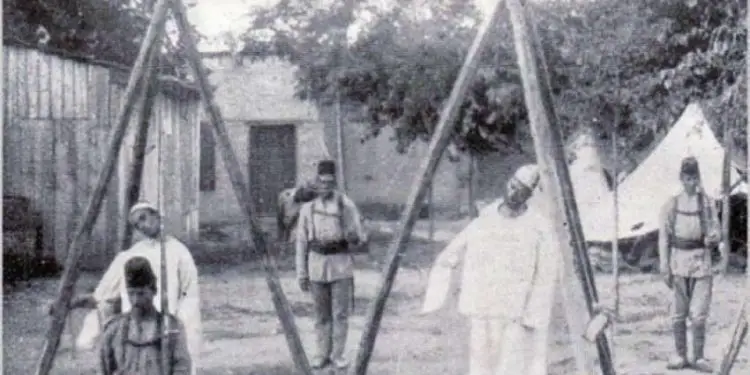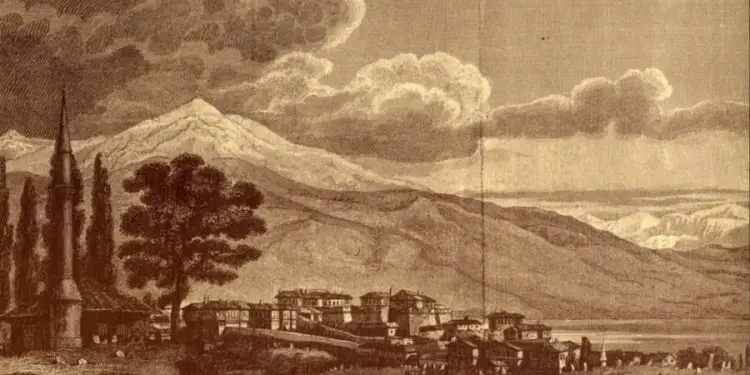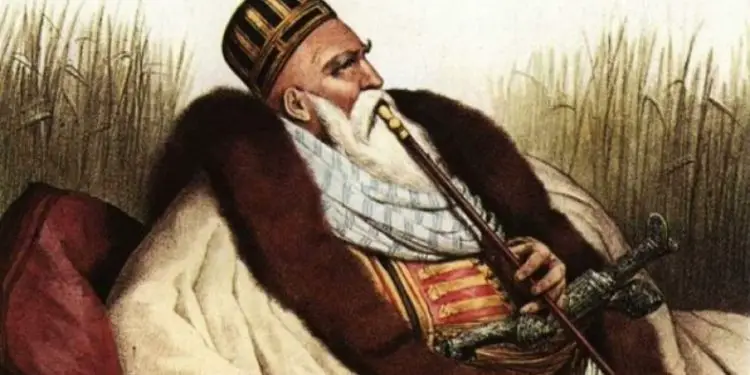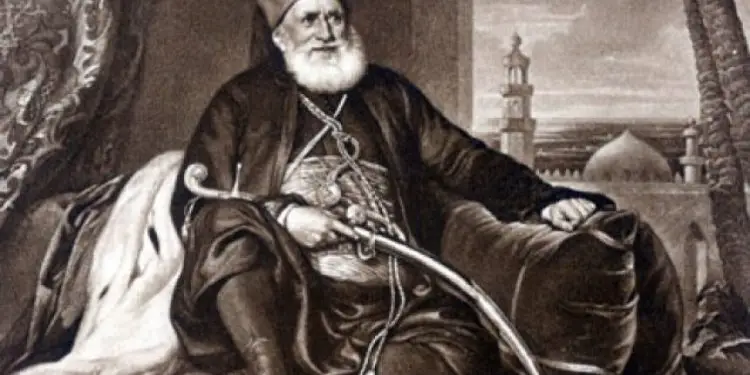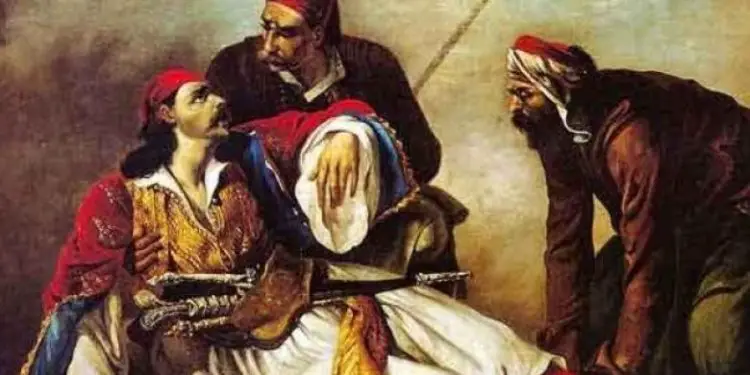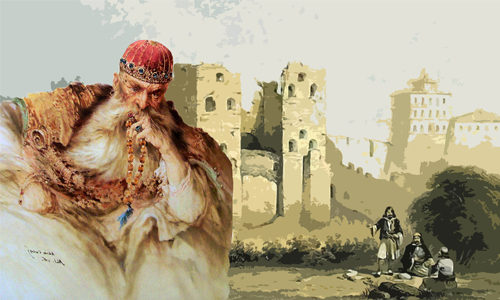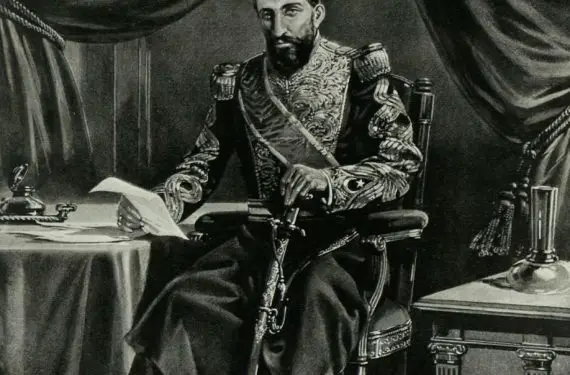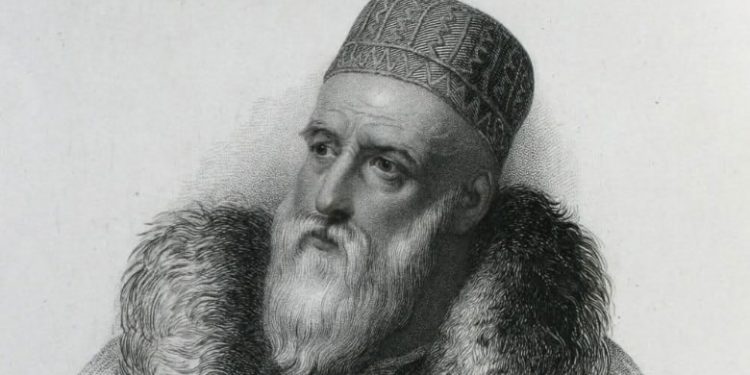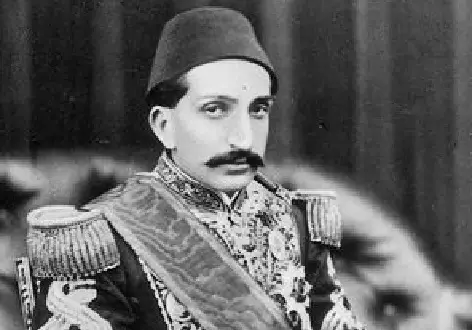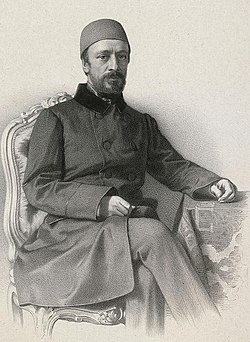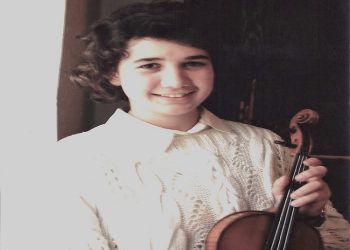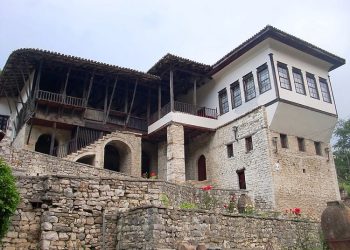Dashnor Kaloçi
Memorie.al publishes the unknown story of the famous patriot Zylyftar Poda, originally from the village of Podë i Kolonje, the former right-hand man of Ali Pasha Tepelena, who in the first two decades of the 19th century, became one of the leaders the most prominent people in the wars for secession from Turkey. The entire activity of Zylyftar Poda, from his connections with the French ambassador, Pukvill, attached to the old Pasha of Ioannina, to his close friendship with Mehmet Ali of Egypt, who helped him in the rebellion against the High Gate of Istanbul, newspaper articles Russian for his conflicts and wars with the High Gate, the folkloric songs that have been dedicated to him, how his figure and role have been treated by Albanian historians, the place he occupies in the History of Albania, up to his bust that is in the Louvre Museum in Paris, which Enver Hoxha also visited in September 1946 with the delegation he led at the Peace Conference in Paris, etc.
If we take a look at the history of the Albanian people in the period before our National Renaissance, referring to many different archival documents of the country and abroad, we will notice that, after Ali Pasha Tepelena, the old Vizier of Ioannina who was executed by the High Gate, because he wanted to break away from Turkey, one of the main figures of the Albanian leaders of that period, and until 1835, we will see that Zylyftar Poda stands out. The famous colonist captain, who for several years was at the head of the anti-Ottoman resistance in South Albania, seriously shaking the High Gate of Istanbul and the Sultan himself, who was forced to invite and receive him with great honors in Istanbul.
Regarding this very popular legendary figure, in addition to folklore songs inherited and preserved in several generations, the periodical press, various books and texts on the history of the Albanian people, published under the auspices of the Institute of History and the Academy of Sciences in Tirana, speak also many archival documents found not only in the Albanian archives, but also in those of various European countries, such as Turkey, Russia, etc. Not only that, but the fame and name of Zylyftar Poda is so great that a bust of him is preserved in the famous Louvre Museum in Paris. Being so, he is also the only Albanian who has had a work of art dedicated to him in various museums outside our country.
Continues from last issue
Siege of Zylyftari in Melesini Castle
With the death of Ali Pasha, Zylyftar Poda broke and severed his relations with Turkey and the people he was close to. He stayed in the mountains of Gramoz, Pindi, Konica, hitting the forces of the Turkish army from time to time. This continued until 1831, when he was attacked by numerous forces from the High Gate of Istanbul, which surrounded him in the fortress of Melesin, where he usually took refuge with his men, who were mostly from the province of Karamuratas, Lešica, Çarshovo, Serrani, etc. The Turkish army gave the first blows to Zylyftar in Ostenica. Regarding the fighting during that siege, which continued for several months, the popular song, among other things, says:
“Zylyftar is waiting for the Nizams to pour out
well, they are coming
I had to let you go
there for war I have Elmaz Xhemna
Melesini yeast yeast
what does the godmother beat the ball with?
Melesini on a rib
nephew fights for aunt
in the square in front of the church
Elmazi fights with his brother
(Grapes) with the side of the square”.
(Zylyftar Poda had a sister, whom he married in the village of Starje, at Xemi Starje’s house, and his sister’s son was named Elmaz Xemi).
Regarding the fighting in the Melesin fortress, between the forces of the Turkish army and the Albanian insurgents led by captain Zylyftar Poda, the well-known historian, Ligor K. Mile, has written, among other things: “However, the defeats of Mustafa Pasha in Macedonia, forced Zylyftar Poda to switch to defensive tactics. Turkish troops under the command of the governor of Thessaly, Mahmud Pasha, were directed against him, by order of the Grand Vizier. After the first battles in the region between Korca and Erseka, in the towers of Qarri, the forces insurgents, led by the son of Poda (Deli Jasa), under the pressure of the enemy troop’s superior in number, retreated. They decided to continue the resistance in the fortress of Melesini, built in a good mountain position, where it was also concentrated Zylyftar Poda himself.
The long siege of the castle began. But the peasant forces were not limited to defense. They carried out daring attacks against the Turkish forces and managed to capture a Turkish commander alive during such an attack. But before the great fire of artillery and when the provisions were nearing the end, the besieged, after five months of manly defense, agreed to cease their resistance, on certain conditions, in October of 1831.”
In the same way, the historian Pandi Rrumbullaku has also done a study on this event, which he titled “Captain of the Pod”, (published on December 14, 1980 in the newspaper “LUFTĘTARI”). Among other things, he wrote: “The popular stand against the invaders continued for a long time, but after very fierce fighting and surrounded on all sides by the enemy army, Zylyftar Poda with his forces concentrated on the mountain of Melesin, waiting to help came from Bushatlliu of Shkodra, whose forces had been damaged by the invaders in the fighting to get there. During the five months that Zylyftar Poda and his men remained besieged there, the fiercest fighting took place at Meles, which was covered in smoke and flames. The High Gate insisted on extinguishing the uprising as soon as possible, because it was afraid of its flames, which had spread throughout Albania. In response, the chief general of Rumelia wrote to the Sultan: “They are steep places and quarries. No tower in this country can be attacked by attack. Zylyftar Poda on the Melesin mountain has three castles, two of which were destroyed by cannon, but the third one, at the top of the mountain, cannot be reached even by cannon, neither with godfathers, it can be defended with 20 rifles”.
Regarding this siege and the fighting that took place during those six months, the folk song, among other things, says:
“Mahmut I looked slowly
that here he fights with colonists
Pode Shala and Barmash
fight all together”.
The assassination of Zylyftar in Istanbul in 1835
Regarding the end of that siege, where Zylyftari and his men stayed for five consecutive months fighting, the well-known historian Ligor K. Mile, among other things, wrote: “But before the heavy artillery fire and when the food reserves were nearing the end, in October 1831, the besieged, after five months of manly defense, agreed to end their resistance, but with some conditions. Talks about surrender began. Zylyftar Poda put forward these demands:
- Forgiveness to all the rebels
- Non-surrender of arms 3. The Turkish authorities were not to confiscate the property of the insurgents.
The Turkish commander, Mahmut Pasha, accepted these conditions. In this way, the uprising of the years 1830-’31, under the leadership of Zylyftar Poda, was suppressed. Zylyftar Poda was forced to leave the country together with his family. The Turkish press announced at the end of December 1831, that Zylyftar Poda was pardoned by the Sultan, but he, in order to keep him under control, asked for his son as a pledge. However, Zylyftari continued to be seen by the High Gate as a dangerous opponent of it, therefore he was treacherously killed together with two of his associates in the autumn of 1835 in Istanbul.
When the siege of the Melesin fortress continued, the Turkish troops carried out repressive measures against the citizens who had participated in the Zylyftar Poda Uprising. Many residents of 10-12 villages were arrested. They were sold as slaves for 20 groschi per man and 10 groschi per woman. With the help of a sultan’s decree, the annual obligation was increased for every Albanian family without distinction up to 40 grosh. Even today, in some villages of Kolonja, such as Gostivisht, Qinam, Podë, etc., memories and folk songs about the peasant uprising of 1830-1831 are preserved”.
“Melesini” newspaper of the USA in 1930 about the Uprising of Zylyftar Poda
The famous uprising of the years 1830-31, led by the legendary captain, Zylyftar Poda, among others, was commemorated on its 100th anniversary (in 1930), by the Albanian community of the USA, who in a article published in the “Melesini” newspaper of WORCESTER, MASS in January 1930, among other things they wrote: “In 1831 an uprising broke out in Leskovik and its district. Zylyftar Poda united the people, Christians and Mohammedans, and started the war against the Turks to gain the freedom of Albania. The Turkish government sent a regular soldier against this. The first attempts were made in Qarr, but as soon as it was broken there, it went to Leskovik and was placed in the church of Saint Illi on the top of Mount Melesin. The people of the district and the city, old men, women and children, were waiting for the gorricas, they were chased and the Albanian army used them with cannons. Thus, the
war in Leskovik lasted nine months. Finally, when no help came, they were defeated and killed. delivered into the hands of Turkey.His companions threw themselves on Mount Neme rchkë and there they fought for some time. Leskovik remained as the capital of Albania for two years. In 1913, Leskovik fell into the hands of the Greeks who, before fleeing, set fire to it. Ksisoj Leskovik remained a ruin. But since the climate is good and the inhabitants of the city and the village are good, there is hope that Leskovik will grow back and become more beautiful than before.”
The letter about the murder of Zylyftar in Istanbul
The causes and reasons that forced the High Gate of Istanbul to take the decision for the execution of Zylyftar Poda, can be clearly deduced from some historical documents that are in the archives of Istanbul and other countries that were under the Ottoman rule at the time. One of these documents is the one published by prof. dr. Petrika Thëngjilli, in his book entitled: “Popular Uprisings in the 30s of the XIX Century (Ottoman Documents), published by the Academy of Sciences and the Institute of History in Tirana in 1978. In this regard, in that letter which is missing the name of the person who sends it to the Sultan is written:
“Your Excellency has doubtless learned some time ago that the insurrection of Shkodra was lately pacified, and that the Vali of Rumelia entered that city six weeks ago without bloodshed. To write to your Excellency on this matter I expected to learn better the details of this momentous conclusion and the circumstances which followed it. Many here are of opinion that Mehmet Ali instigated it, or at least that, if he was not the author himself, his emissaries by day skillfully profited from the discontent the emergency caused by Hafëz Pasha’s administration, as well as the mobilization of regular troops ordered by the Porte.
However, the name of the viceroy of Egypt is not only in Northern Albania, but also in Southern Albania, the word of unification of all the disaffected. They only hope in him and it is quite easy to penetrate their thoughts when, complaining about the end of Shkodra’s struggle. They say out loud that it happened too soon or too late and that, after all, they only lost two years. The tragic end of Silhidar Poda, who was beheaded a short time ago in Constantinople, has shocked some and angered many others, because this man, although he was not here, maintained the highest influence from Berat to the Golden Bay.
During his exile in Crete, he was in constant contact with the leaders of Central Albania and was generally seen as the mediator that Mehmet Ali had chosen to come to terms with them. However, his journey to Constantinople, for which I have not yet been able to determine the causes, his pardon by the Sultan, in consequence of which his family received again last year with honor their very large estates, the most finally, the numerous letters in which he was fond of speaking of the fine reception his sovereign had given him, made his countrymen, who do not know the real reasons which drove him there, look upon his execution as a dirty well”. (…)
The songs dedicated to the rebellions of the captain of Poda
All the patriotic activity of Zylyftar Poda, his wars and feats, were passed on in the form of folk tales and folkloric songs between generations, coming to our days. Regarding these popular folklore songs, in his study, the well-known historian Ligor K. Mile, among others, wrote: “According to Spiro Dines, the songs dedicated to the uprisings of Zylyftar Poda were numerous and were sung with love by the people. Among these songs the social composition of the participants of the uprisings, which the popular poet calls “harbute”, or “thieves”, i.e., poor peasants, rose up with weapons in hand against the Turkish government, is also clear.
“Melesini soft mountain /
All around with harbut
Melesini up
Own the arrow
This church has a niche
He saw the Nizams at all
At the gate of Zylyftari
hanging the head of the household”.
The High Gate and the Sultan received Zylyftar with honors in Istanbul
The great role of Zylyftar Poda as a popular leader of the anti-Ottoman uprisings in the first two decades of the 19th century is also known by the well-known historian, prof. dr. Petrika Thëngjilli, who in his book “Popular uprisings in the 30s of the 19th century (Ottoman Documents), published by the Academy of Sciences and the Institute of History in Tirana in 1978, from the preface of the book, among others, he wrote: “During the second half of the 18th century and the first 30 years of the 19th century, the struggle of the Albanian people to break away from the political dependence of Istanbul, directed by the feudal class with the Bushatlli and Ali Pasha Tepelena at the head, really resulted in the collapse of the Albanian paschals, but also shook the foundations of the Ottoman rule in the Balkan Peninsula, helping other peoples to gain their freedom and raised the fighting spirit in the heart of the people, and especially his conscience to be master of himself. The collapse of the Albanian empires and the defeat of the uprising of 1831, led by Zylyftar Poda, brought to light that the feudal class was not able to maintain either the autonomy of the government or the separation from Istanbul, which it dreamed of making a reality.
Among other things, the great role of Zylyftar Poda as one of the most influential popular leaders in South Albania is also known from the reception with great honors given to him by the Sultan in Istanbul. In this regard, the well-known historian, Petrika Thëngjilli, in the aforementioned book, among others, writes: “The blows suffered by the Albanian feudal class during the period 1822-1831 had a political and economic character. However, as the dissatisfied feudal lords who were inside country, as well as those who left, did not give up the fight to return the old privileges. Abdyl bey Koka, Shahin bey Delvina, Zylyftar aga Poda and captain Tafil Buzi, Gjoleka, Latif Elmazi, Muharrem Kolonja, etc., who had been able to were fleeing, had taken refuge in Albania. The most influential captain in Southern Albania, Zylyftar Poda, agreed with the High Gate and went to Istanbul, where he was received with honors by the Sultan himself. Indeed, his respectful reception by the Sultan, the return of his family to Albania with the rights he enjoyed before the uprising of 1831, which were done with the intention of putting him at the service of the state, did not have the proper effect to remove him from the insurrectionary activity”. (AMAE, Memories et Documents, Turquie, vol. 76 Naupli, September 6, 1834, p. 232).
Zylyftar Poda in popular folk songs
The life, work, patriotic activity and anti-Ottoman resistance with the constant wars of Zylyftar Poda against the armies of the High Gate of Istanbul, have been preserved in various traditions and in the historical memory of the Albanian people, being inherited and passed down from generation to generation. In the same way, the people have also immortalized it in various popular folklore songs, which have been passed down through several generations, being preserved until today. One of those who collected folk songs for Zylyftar Podë, was also the patriot of the National Renaissance, Thimi Mitko (known as the most diligent collector of Albanian folklore), who published them in his famous work “The Albanian Bee “, a book that was translated by Gjergj Pekmezi in 1924 and reprinted in Vienna, Austria. These popular songs for Zylyftar Podë collected by Thimi Mitko, we are publishing in these few lines together with three other songs that are dedicated to that famous patriot, who has left deep traces in the historical memory of the Albanian people.
“ALBANIAN BEE” by Thimi Mitko
The song of Zylyftar Poda, who was besieged in his forts in the mountains of Melesina by Mahmut Pasha in 1831
They said, Rumelia came out,
Albania took the lead
They said, the sadrazem came out
Get up, Albanians, let’s go
Zylyftari Podësa,
I send a card to Shkodër
I also send them to Shkodra,
Manastir got up and left
Who burned Qarri’s towers?
Rakip bey of Zylyftar.
Zylyftar mustache-yellow,
Wait for the prayers to pour out,
Let them come, well, let them come,
I have Mersina at the well.
Rakip bring me a card.
Collect nothing and come back
Melesini gentle mountain,
Around and around,
Melesini yeast yeast,
The ball is beaten by the godmother.
Melesin up,
Own the arrow.
This church with a niche,
He saw the Nizams at all.
This church has three steps,
All around with initiative.
At the gate of Zylyftar,
The head of the household hanged.
Elmaz Xemi with his brother,
They were killed for Zylyftar.
Man, Elmaz Xhem, man,
Mostly with stones,
Elmazi with kushrina,
I wish I had what they laid”
Song for Ismail bey Vlora and Zylyftar Poda
“Cry my Vlora, cry Kanina,
Smaili go to Ioannina,
They sent him greetings,
Bake with Rumelia,
They came to Derven to lead,
Our Tafil and Jhelil,
Malo, don’t go to Ioannina,
Don’t trust Osmanllia,
That they raised your well,
Zylyftari sent a card:
Come back Ismail Bey again,…
Lunch in Zharovina,
Dinner in Ioannina,
They didn’t say hello,
Smiley climbed the stairs,
Face to face,
Two cobras were given to him,
Smail be, o’ Smail be,
friendship where you leave it,
Fuck your head…”
Popular Prrenjo’s best son
Son, the best Prrenjos,
This Muhua with zahir,
They raised the cauldron on their feet,
Christians and Muslims,
They left Ziliftar Poda,
They didn’t release him immediately.
Ki Ziliftari as Ali,
Taborre tore the Turk
Paramithi-Chameri, 1982
Zylyftar Poda
They say the Turks set fire to it
To burn Melesini
Every palm caught fire
To burn inside Zylyftari…
The high Melesini does not move
Pours fiery lava on enemies
Zylyftari never shakes
Rocks and stones fall on Turks…





